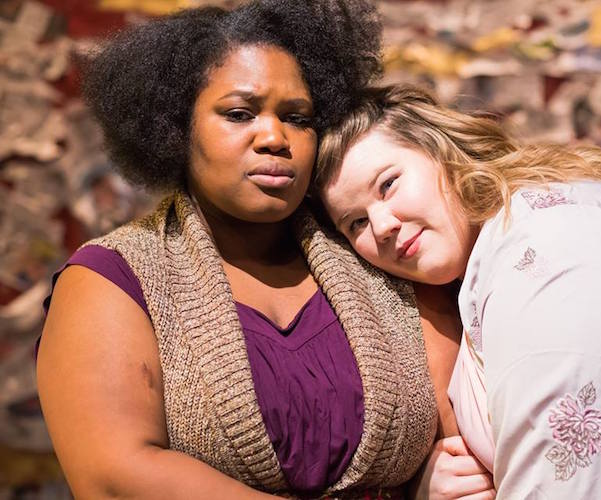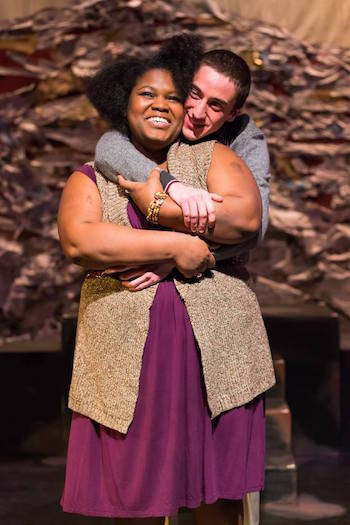Theater Review: Flat Earth’s “Antigone” — Inspired, But Flawed
Flat Earth Theatre’s staging of Antigone was filled with strong performances and provocative ideas.
Antigone, adapted by Lewis Galantiere from the play by Jean Anouilh. Directed by Lindsay Eagle. Staged by Flat Earth Theatre at the Mosesian Center for the Arts in Watertown (closed).

Regine Vital and Rachel Belleman in the Flat Earth Theatre production of “Antigone.” Courtesy of the artist.
By Erik Nikander
Flat Earth Theatre’s production of Antigone immersed audience members in the play’s world from the moment they stepped into the theatre. On the way to their seats, theatregoers walked through a sectioned-off passageway into the black box at the Mosesian Center for the Arts. Flanked by guards in crisp uniforms, they entered a space filled with remnants of Greek columns. It’s as if one was making a pilgrimage into a bombed-out version of Thebes. This carefully-crafted venture into theatrical interaction carried throughout the staging, though a few serious stumbling blocks ultimately prevented the production from creating the rich emotional illusion it strove for.
Antigone‘s plot is archetypal. Antigone (Regine Vital), daughter of the disgraced Greek king Oedipus, is faced a moral dilemma for the ages. Her uncle Creon (George Page) has risen to the throne and decreed that her dead brother Polyneices is to be left rotting in the open air, denied the burial rites demanded by the gods. The penalty for disobeying Creon’s mandate is death, but Antigone is unable to bear this injustice. She buries her brother, putting her life and her engagement to Creon’s son Haemon (Cody Sloan) at risk in the process.
Flat Earth Theatre’s creative team chose to stage an excellent version of this long-revered tragedy. Written by French dramatist Jean Anouilh and translated by Lewis Galantiere, the text is poetic and playful, eagerly digging into the antique fabric of the play while making sure the action remains fresh and modern. Anouilh and Galantiere were not intimidated by the ‘classic’ status of the text — a sense of injustice and moral agony suffuses every scene.
At the play’s opening, we were presented with a three-person Greek chorus, played by Elbert Joseph, Emily Elmore, and Michael John Ciszewski. Dressed in tattered layers, as if they were post-apocalyptic scavengers,they performed a ritual with a bottle of wine before they began their (and our) journey through Antigone’s unhappy tale. Director Lindsay Eagle found a way to incorporate both spoken English and sign language into the chorus’s performances, a touch that felt natural and fluid as well as supremely theatrical. The physicality of the chorus was captivating, especially in Joseph’s case; his performance was mostly silent, but a gesture or a glare carried enough meaning to make spoken words feel superfluous.
As Antigone, Regine Vital was also terrific. Throughout the play, she sustained a tricky balance of moral certitude and youthful inexperience. Her voice was filled with an indomitable fire, but she never lost sight of the character’s human vulnerability amidst the passion. Though she didn’t have much time on-stage, Rachel Belleman made a good impression as Ismene, as did Cody Sloan as Haemon. Their performances, while not as nuanced as Vital’s, added invaluable texture to Antigone’s world. We sense the high price that Antigone pays by going through with the burial.
Unfortunately, George Page’s performance as the domineering tyrant, Creon, didn’t reach the same level of quality. (This weakness is not entirely Page’s fault; reportedly, he’s a late-minute cast addition brought in to replace another actor.) Page seemed to be struggling with his lines, which eliminated any sense of drama and tension from his major scenes with Antigone. Creon must be calculating and stubborn, vehemently clinging to his decrees — even if it means he is driven to spit in the face of morality to do so. Here he just seems befuddled, utterly outmatched by his young foe’s conviction. The power of tragic conflict, carefully built up before Creon’s appearance, was dissipated in this stretch of the production.

Regine Vital and Cody Sloan in the Flat Earth Theatre production of “Antigone.” Courtesy of the artist.
Another note that doesn’t quite strike right was the use of the guards, played by Kim Feener, Nicole Frattaroli, and Michael Rodriguez. Their semi-comic performances as Creon’s underlings felt out of place. The early scenes emit a morally serious, almost fatalistic mood, and that made for an awkward contrast with the bumbling goofiness of the guards. This comic relief felt flimsy: what was this tonal contrast supposed to achieve? The production seemed to be interested in making a point about police brutality, but if that was the intent the execution didn’t do the subject justice.
On a technical level, the production generally succeeded. Darren Cornell’s set was simple yet dramatically versatile. The sound design, provided by Chris Larson, amplified the drama through moody, minimalistic music, a choice that deepened the disquieting ambience. The costumes by E. Rosser and the props by Emily Penta drew inspiration from a variety of eras, heightening the timeless quality that runs throughout Anouilh’s script.
Flat Earth Theatre’s staging of Antigone was filled with strong performances and provocative ideas: Vital supplied an exceptional Antigone, and many of Eagle’s directorial choices were inspired. But the production’s lack of cohesion, as well as some lackluster performances, held it back. This staging of a Greek tragedy was often memorable, but it could have soared.
Erik Nikander is a critic, playwright, and filmmaker based in the New England area. His film criticism can be read on Medium and his video reviews on a variety of topics can be viewed on Youtube at EWN Reviews.
